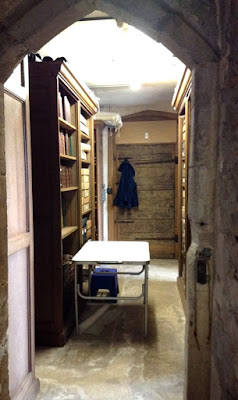Berkeley Castle Archives: an interview with David Smith part 2.
Following on from our blog post yesterday, students Tatchiana and Hattie discussed conservation issues facing Mr Smith as an archivist and his other interests.
What do you personally consider to be the most interesting research that has been conducted using anything from the archives? Is there anything which stands out as particularly significant?
What are the current conservation issues that you face as an archivist?
Well, a lot of the documents were stored in poor conditions centuries ago, and what we’re trying to do is, as we’re cataloguing them in more or less chronological order - or at least by periods in slabs of chronology - we’re doing the conservation in the same way. But conservation is expensive because it’s a very skillful business. The castle conservator has been working here since 1989, and she comes about three times a year, so what I’m trying to do is to work systematically through the documents now, dealing with the oldest ones that need conservation through to more modern ones. I don’t stick rigidly to that because some of the bindings of the estate rentals and so forth are pretty poor and need rebinding. When you repair a document you can never improve it; as far as a document is concerned, you can only stabilise its conditions make sure no more text is lost, and that’s what we’re trying to do. So the issue of conservation really is one of resources - there’s a lot more to do and the estate doesn’t have the resources to get on with it as fast as it would like.
 |
| The Muniment room. |
If people really want to get into archives, I would say go and visit as many as you can within your range of travel, because most archivists will gladly spend an hour or so with you showing you round and talking to you, and it’s only that way that you can get a genuine appreciation of what archives really mean. I would have to show you, or have you as a sort of work experience person for a day to get a better idea of it, so the best thing to do is to go and find other archives - as many different sorts as you can - and talk to the people to find out what they do and how they do it, and then you’ll know whether it’s the job for you or not.
What are your other interests outside of the archives?
Well, I like walking in the countryside, I wish I knew more about how to read a landscape. I read widely, I read English literature in the broad sense, and I also read a lot of rubbish because it’s lightweight and undemanding, and it’s quite enjoyable. But a lot of the things I do are actually archives related. I do adult education part time, only three or four courses a year. I do one weekend for Oxford University every year, one or two day schools for the Society of Genealogists in London, and occasionally others as requested. These are things like learning to read old handwriting, understanding manorial records, that sort of stuff. I like to keep them fresh. I give talks, maybe ten or twelve a year, not tremendous. I have about sixteen talk titles that I would give, they’re all accessible on the internet, and half of them are about Berkeley Castle or Berkeley-related subjects while the other half are other topics that I’ve worked on over the years.Oh, and I go to the theatre, film, concerts, West End musicals when I can find the time, or there’s one to go to, because they’re mostly reruns these days. I’ve got grandchildren in London who I go and see as much as I can.
David Smith’s workshops with the Society of Genealogists in London can be booked at http://www.sog.org.uk/books-courses/events-courses/.
Comments
Post a Comment